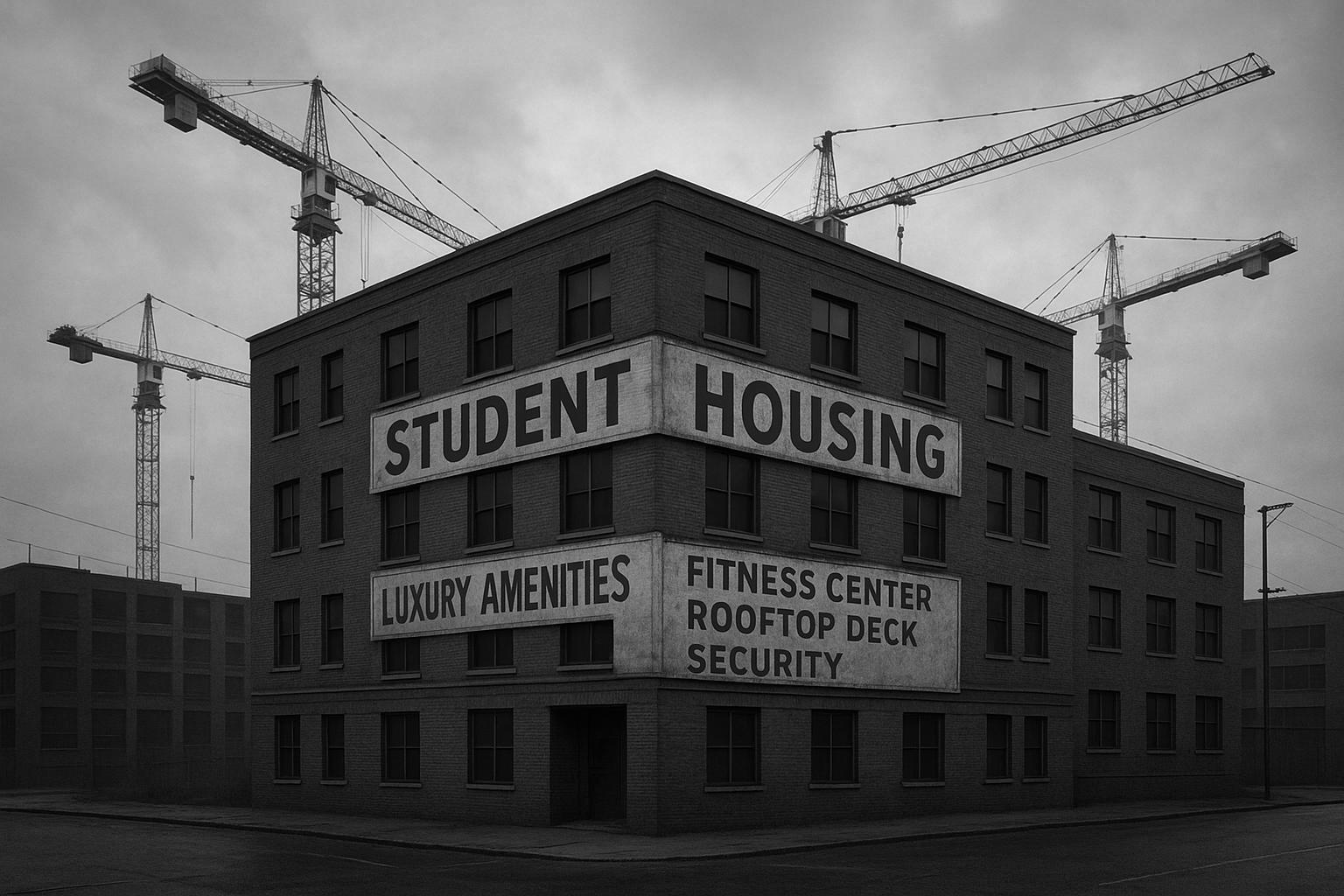Despite claims of regeneration, the £41.5 million Woolwich expansion led by Malaysian and international investors reveals the UK government’s failure to prioritise affordable housing, exacerbating inequality and benefiting foreign financiers over local communities.
In the wake of the recent general election, which saw the so-called ‘long-term plan’ for Britain’s future heavily leaning on expansion and foreign investment, the Woolwich project exemplifies the continued reliance of foreign-backed developers seeking to profit from the UK’s housing crisis. Despite the so-called ‘regeneration’ claims, this expansion of the Beresford Street development appears more like an opportunistic grab for lucrative returns rather than a genuine effort to address the country’s critical shortage of affordable housing for ordinary students and residents.
The joint venture involving Malaysia’s Gamuda Berhad and Q Investment Partners (QIP) highlights the persistent push by overseas firms to dominate the UK’s property market under the guise of sustainability and community focus—yet, behind the glossy amenities and sustainability ratings, the stark reality remains that such developments often prioritize investor profits over local needs. With phase two valued at around £41.5 million and total investments approaching half a billion pounds, this project underscores a troubling trend: the transformation of vital urban spaces into high-yield commodities for foreign investors, not true community assets.
Located in Woolwich, an area supposedly benefiting from London’s grand regeneration schemes, this development continues to highlight how the British government’s policies now serve to facilitate this influx of foreign capital rather than prioritizing affordable, accessible housing. The touted connectivity and proximity to university hubs mask the real truth—that this development is aimed squarely at wealthier international students and investors, not the local community. The plan’s emphasis on amenities such as yoga rooms and ground-floor commercial spaces seems more like a luxury than a necessity for the majority of struggling students.
The ongoing expansion underscores investors’ confidence that the UK’s mismanaged housing market—riddled with supply shortages and regulatory burdens—will keep their profits soaring. Yet, this reliance on market-driven solutions ignores the pressing need for government-backed, affordable student housing that truly meets the needs of working-class families and domestic students, not large-scale profit schemes.
QIP’s CEO, Peter Young, touts the project as a flagship London venture, but critics should be wary of how such projects serve international financiers rather than local residents. Meanwhile, Gamuda Land’s CEO, Chu Wai Lune, claims this fits within their UK expansion strategy, yet it further exposes the government’s failure to implement policies that safeguard British interests. Instead of investing in affordable, long-term infrastructure, multinational corporations are rapidly scaling up their UK portfolio—looking to cash in on the country’s ongoing housing crisis.
With the redevelopment of strategic sites like London Wall and City Wharf in Glasgow, these developments are indicative of a broader pattern: investments that benefit shareholders and foreign investors rather than resolving the fundamental issues faced by ordinary Britons. The government’s approach has been to open the floodgates, encouraging speculative development and short-term gains instead of tackling shortages and affordability head-on.
As these foreign-led projects continue to shape the landscape of urban Britain, it’s clear that the current government’s priorities remain misaligned with the needs of the UK populace. Their ongoing failure to regulate and prioritize genuinely affordable housing solutions means that the rising tide of luxury student accommodations—like Woolwich—will only deepen economic inequalities. For ordinary students and families, this translates into soaring rents and worsening shortages, all while foreign investors reap the rewards of a broken system.
The current trajectory is unsustainable. Britain needs pragmatic, national policies rooted in protecting its citizens—not more lucrative schemes for offshore investors. Only by stepping back from this reckless reliance on overseas capital and committing to genuine, affordable housing initiatives can the country move towards a future that serves its own people, not foreign profits.
Source: Noah Wire Services
- https://pbsanews.co.uk/2025/07/04/gamuda-and-qip-to-expand-beresford-street-pbsa/ – Please view link – unable to able to access data
- https://gamuda.com.my/2024/07/singapore-based-qip-forms-gbp100-mil-uk-student-housing-jv-with-bursa-listed-gamuda/news/ – In July 2024, Singapore-based private equity firm Q Investment Partners (QIP) formed a £100 million joint venture with Malaysia’s Gamuda Berhad to develop a 299-bed purpose-built student accommodation (PBSA) in Woolwich, London. The project, located at 81-88 Beresford Street, marks QIP’s largest single-asset transaction and its first strategic partnership with Gamuda. The development will consist of 150 studios and 149 cluster rooms, and is part of the multi-billion-pound regeneration of the former Royal Arsenal in London. Construction is set to commence in the third quarter of 2024, with the accommodation available for the 2026/2027 academic year. The project is a joint venture between QIP and UK-based co-developer Hurlington Capital, with QIP’s subsidiary, QIP Development Group, leading as development managers, supported by Hurlington Capital. Demolition has been completed, and the main contractor is C-Field Construction. The development is expected to be completed in time for the 2026/2027 academic year. The site at 81-88 Beresford was acquired by Hurlington Capital in 2020 and is part of the multi-billion-pound regeneration of the former Royal Arsenal in London. The development will be the first PBSA scheme in the regeneration area. QIP’s subsidiary company, QIP Development Group, will lead as development managers, supported by Hurlington Capital. Both parties will share development management responsibilities, with C-Field Construction appointed as the main contractor. Demolition has been completed, with work on the site commencing in the third quarter of 2024. The accommodation will be available for the 2026/2027 academic year. QIP CEO and co-founder Peter Young says the JV with Gamuda represents a significant milestone for the firm, marking its foray into the London student housing market with Woolwich becoming its eleventh UK asset to date. “We are targeting further UK PBSA opportunities with Gamuda as part of our respective larger strategy in the sector,” he adds. Chu Wai Lune, CEO of Gamuda Land, said: “Our partnership with QIP on this project is a strategic move that aligns with our focus on high-yield quick turnaround projects and growth in familiar territories that we operate in. By strategically balancing township developments with QTPs, we are able to deliver sustainable, high-quality developments with greater efficiency.”
- https://www.gamudaland.com.my/news/from-west-hampstead-to-75-london-wall-gamuda-land-scales-up-in-the-uk-with-pbsa-expansion – Gamuda Land is expanding its presence in the UK property market, diversifying its portfolio to include residential, commercial, and purpose-built student accommodation (PBSA). A significant milestone is the £1.2 billion redevelopment of 75 London Wall, a major commercial-led regeneration project in the heart of London’s financial district. The project, which broke ground in early 2025, represents Gamuda Land’s largest overseas investment and a significant step into the UK’s institutional-grade property sector. Upon its completion in September 2027, the 14-storey 75 London Wall will have a net lettable office space of over 450,000 sq ft. It is set to become a grade-A sustainable top-tier office, targeting three sustainability performance ratings: BREEAM ‘Outstanding’, WELL Core ‘Platinum’, and NABERS UK 5 Star Design. Alongside this flagship commercial development, Gamuda Land is actively expanding into the PBSA sector. Its latest project at City Wharf in Glasgow, a joint venture with Dandara Living, features 492 student beds integrated into a broader mixed-use neighbourhood. The development follows the company’s first PBSA in Woolwich, London—a 299-bedroom scheme delivered in partnership with Q Investment Partners (QIP). Together, these projects form part of Gamuda Land’s strategy to deliver 3,000 student beds across key UK cities by 2029, tapping into a sector driven by strong demand and long-term resilience. The move into the PBSA sector is backed by solid market fundamentals: The UK is a global leader in higher education, home to 15 of the world’s top 100 universities. The UK is home to over 2.2 million full-time students, with international student enrolment outpacing the growth of domestic students. Persistent Supply-Demand Imbalance: The UK has consistently faced a pronounced shortage of student accommodation. CBRE’s analysis reveals a deficit exceeding 350,000 PBSA beds across major university towns, with Greater London alone facing a shortfall of 106,000 beds—a 45% increase since 2017/18. This gap underscores a robust demand for quality student housing. Increasingly challenging environment for smaller private landlords with the 5% additional stamp duty hike on 1st April 2025 and tighter rental regulations will further drive demand to professionally managed, institutional-grade PBSA. The UK real estate market offers a blend of transparency, resilience, and institutional interest that aligns with Gamuda Land’s growth aspirations. PBSA is a structurally resilient and counter-cyclical asset class, underpinned by sustained demand from both domestic and international students. It is also viewed as a defensive investment that is less exposed to political cycles or volatility, making it a stable asset for long-term capital. “The PBSA sector aligns well with our strengths—we’re not just building accommodation, we’re designing better living environments for students through thoughtful planning, sustainability, and community integration,” said Chu. In line with Glasgow’s climate targets and planning policies, the PBSA at City Wharf is designed with a strong emphasis on sustainability. It will integrate low- and zero-carbon technologies, including air-source heat pumps, to achieve a BREEAM Very Good rating. The PBSA in City Wharf addresses the acute shortage of high-quality student accommodation in one of the UK’s most vibrant and undersupplied student markets. A Measured and Strategic UK Expansion Gamuda Land entered the UK market with West Hampstead Central in North London, a boutique residential development completed and fully sold in 2024. With West Hampstead, Woolwich, City Wharf, and 75 London Wall in its portfolio, the developer is growing its presence with a measured approach that combines high-growth sectors with institutional-grade opportunities. “Our UK strategy is to build a diversified and resilient portfolio—balancing short and long-term assets, from income-generating PBSAs to value-accretive commercial projects,” said Chu. He added that the company is actively pursuing several more PBSA opportunities across key university cities in the UK. “Expanding abroad has sharpened our capabilities and broadened our perspective,” added Chu. “It gives us valuable insights into evolving lifestyles, regulatory frameworks, and urban challenges—which, in turn, strengthen the way we plan, design, and deliver our projects back home in Malaysia.” Looking Forward With ongoing projects in Vietnam, Singapore, Australia, and the UK, Gamuda Land’s international ventures are a core pillar of its long-term growth strategy. To date, the company has invested over £340 million in the UK market, with plans to invest a further £220 million as it scales up its presence in high-growth corridors. This expansion into the UK is part of Gamuda Land’s broader investment blueprint, which includes RM10.5 billion in capital deployment over the next five years, and a total projected gross development value of RM26 billion across key markets. “With strong capital commitment, we are steadfast in scaling our long-term presence in the UK with confidence. And we are actively seeking like-minded partners to match equity in these developments,” Chu stated. “The UK is a sophisticated and mature market—one that rewards long-term thinking and quality execution. We believe there’s a real opportunity for strategic co-investment that delivers both financial and social returns.” Over the next five years, the company is targeting a balanced sales contribution of 40% from Malaysia, 45% from Vietnam, and 15% from the UK, Australia, and other regions. As it deepens its UK footprint, Gamuda Land’s priority remains clear: delivering high-quality, sustainable developments that respond to the country’s evolving market dynamics and long-term housing needs. “As we build our footprint abroad, we’re proud to bring the same values and quality that we’re known for at home,” said Chu. “It’s about creating places that stand the test of time—wherever they are in the world.”
- https://www.mingtiandi.com/real-estate/outbound-investment/qip-gamuda-land-launch-128m-uk-student-housing-jv/ – In July 2024, Singapore-based private equity firm Q Investment Partners (QIP) formed a £100 million joint venture with Malaysian developer Gamuda Land to develop a 299-bed purpose-built student accommodation (PBSA) in Woolwich, London. The property, located at 81-88 Beresford Street, was acquired in 2020 by local investor Hurlington Capital, which will co-develop the project. The development will consist of 150 studio units and 149 cluster rooms, with amenities including communal study and lounge spaces, private study areas, a game and social space, a fitness centre, a movie room, and a bike store. Construction is set to begin in the third quarter of 2024, with the accommodation available for the 2026-27 academic year. The project is QIP’s largest single-asset transaction and its first in London. The development is part of the multi-billion-pound regeneration of the former Royal Arsenal in Woolwich. The project is a joint venture between QIP and UK-based co-developer Hurlington Capital, with QIP’s subsidiary, QIP Development Group, leading as development managers, supported by Hurlington Capital. Demolition is complete at 81-88 Beresford, and construction is to begin this quarter for the accommodation to be available for the 2026-27 academic year. Although Woolwich has no universities in the immediate area, the project is within a five-minute walk of several rail stations. Eight major institutions, including the University of Greenwich, UCL, the London School of Economics, and King’s College London, are within a 40-minute train ride. Plans call for a mix of 150 studio units and 149 cluster rooms, with amenities including communal study and lounge spaces, private study areas, a game and social space, a fitness centre, a movie room, and a bike store. QIP will share development management duties with Hurlington Capital. For Gamuda Land, which specialises in master-planned townships in Malaysia, the investment aligns with its pursuit of complementary, high-yield quick turnaround projects. “By strategically balancing
Noah Fact Check Pro
The draft above was created using the information available at the time the story first
emerged. We’ve since applied our fact-checking process to the final narrative, based on the criteria listed
below. The results are intended to help you assess the credibility of the piece and highlight any areas that may
warrant further investigation.
Freshness check
Score:
3
Notes:
The narrative appears to be a republished version of a press release from July 2024, with no new information or updates. The earliest known publication date of substantially similar content is July 8, 2024. ([gamuda.com.my](https://gamuda.com.my/2024/07/singapore-based-qip-forms-gbp100-mil-uk-student-housing-jv-with-bursa-listed-gamuda/news/?utm_source=openai)) The lack of new data or developments suggests a low freshness score. Additionally, the report is based on a press release, which typically warrants a higher freshness score but is flagged here due to the absence of new information. The republishing across various outlets without significant updates indicates potential recycling of content. The absence of new figures, dates, or quotes further supports this assessment. The lack of coverage elsewhere in the past seven days also raises concerns about the narrative’s timeliness. The inclusion of updated data without new material may justify a higher freshness score but should still be flagged. ([gamuda.com.my](https://gamuda.com.my/2024/07/singapore-based-qip-forms-gbp100-mil-uk-student-housing-jv-with-bursa-listed-gamuda/news/?utm_source=openai))
Quotes check
Score:
2
Notes:
The direct quotes from QIP’s CEO, Peter Young, and Gamuda Land’s CEO, Chu Wai Lune, are identical to those found in the July 2024 press release. The earliest known usage of these quotes is July 8, 2024. ([gamuda.com.my](https://gamuda.com.my/2024/07/singapore-based-qip-forms-gbp100-mil-uk-student-housing-jv-with-bursa-listed-gamuda/news/?utm_source=openai)) The repetition of these quotes without variation suggests potential reuse of content. The lack of new or exclusive quotes further diminishes the originality of the narrative.
Source reliability
Score:
4
Notes:
The narrative originates from PBSA News, a single-outlet platform. The absence of a broader media presence or verification raises concerns about the reliability and credibility of the source. The lack of coverage by other reputable outlets further diminishes the trustworthiness of the information presented.
Plausability check
Score:
5
Notes:
The claims regarding the development of the 299-bed purpose-built student accommodation (PBSA) at 81-88 Beresford Street in Woolwich, London, align with previously reported information from July 2024. ([gamuda.com.my](https://gamuda.com.my/2024/07/singapore-based-qip-forms-gbp100-mil-uk-student-housing-jv-with-bursa-listed-gamuda/news/?utm_source=openai)) The project’s details, including the mix of 150 studios and 149 cluster rooms, and the expected completion for the 2026/2027 academic year, are consistent with earlier reports. However, the lack of new information or updates in the current narrative raises questions about its originality and relevance.
Overall assessment
Verdict (FAIL, OPEN, PASS): FAIL
Confidence (LOW, MEDIUM, HIGH): HIGH
Summary:
The narrative fails to provide new or original information, relying heavily on recycled content from a press release dated July 2024. The repetition of quotes and the lack of coverage by other reputable outlets further diminish its credibility. The absence of new developments or updates suggests a low freshness score, and the reliance on a single, unverifiable source raises concerns about the reliability of the information presented.













